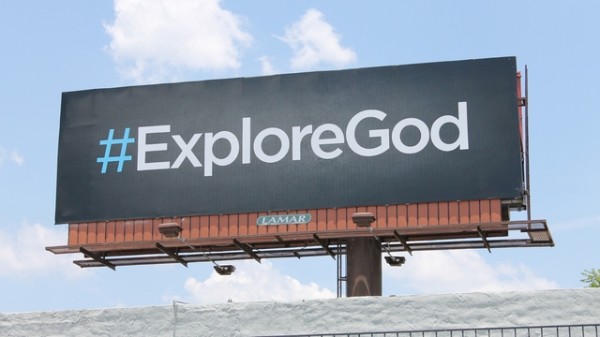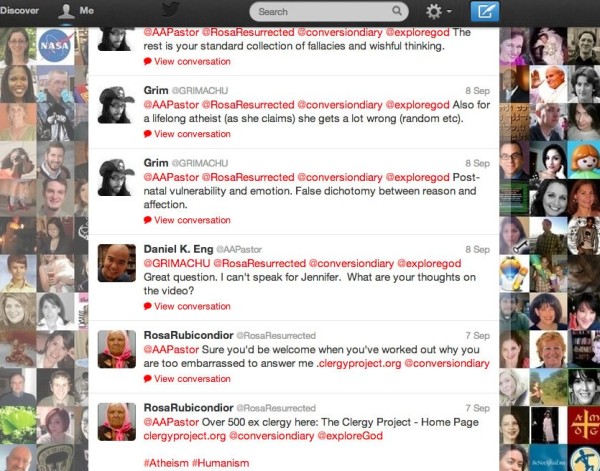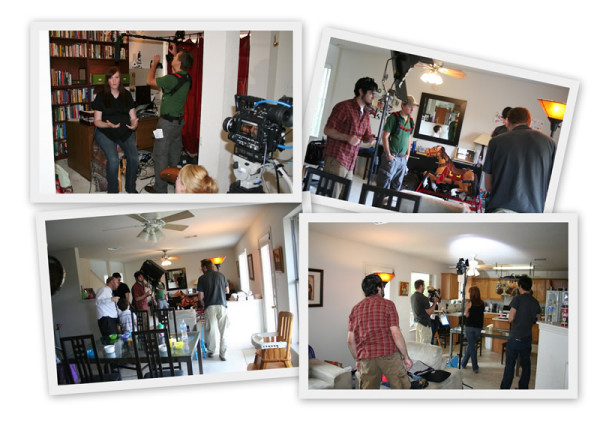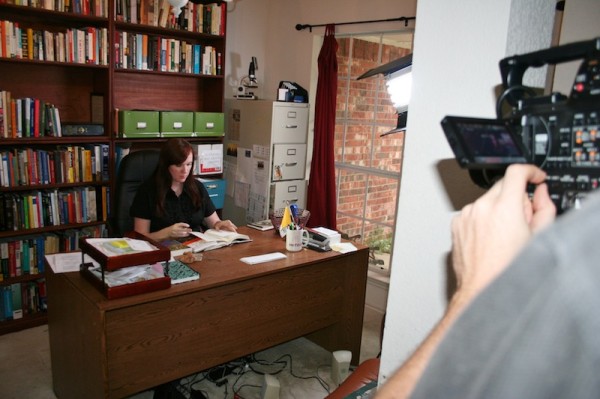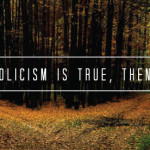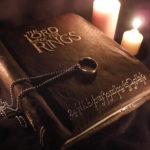On Proving God
by Jennifer Fulwiler
Filed under The Existence of God
There’s a huge movement that’s sweeping Austin right now called Explore God. If you live in central Texas, you know what I’m talking about. You pull out of your driveway and you see a sign in the yard across the street. You get on the highway and there’s a billboard. You drive past a church to see a big Explore God banner out front, then, on your way home, more signs dot the houses as you drive through your neighborhood.
I was blown away by the saturation level that the people behind this movement managed to achieve, and curious about the campaign’s content. Since it seems to be targeting seekers and non-believers, I pulled up the section of the website that discusses atheism to see whom they got to address this topic. To my shock, I found...
Me.
I vaguely remembered the time a camera crew visited my house when I was 9,000 months pregnant. Evidently that was for this Explore God thing. I had no idea! Well, I had some idea. I mean, they said something about the internet and God and billboards, but I didn’t catch most of it since I was busy trying to find a way to ask if they needed any footage of me taking a three-hour nap.
Anyway, I would have eventually figured out that something was up, since my email and social media accounts have been hit with a new round of feedback from the online atheist world. It’s been a while since I’ve had large numbers of people calling my conversion, my sanity, and my mental coherence into question, and it’s provided me with a good opportunity to take a step back and ask myself, Why did I become a Christian?
I’ve been pondering the question for the past few days as I fold laundry and make lunches, and I thought I’d share my thoughts.
On Having Proof
The issue that arises over and over again when you talk about atheist-to-Christian conversions is one of proof. We atheists had seen plenty of people concoct nonsensical and internally inconsistent belief systems because they confused “what feels good” with “what is true.” It struck me as a very dangerous path to start assenting to beliefs that cannot be disentangled from the messy world of subjective experience.
Deep down in my heart of hearts, I might feel that the sun revolves around the earth...but before I start announcing this as a truth about the way the universe works, I should go ahead and examine the evidence to see if it is actually true. It is this kind of never-wavering requirement for proof that allows us to have a clear-eyed look at the universe. No area of life should be exempt from this sort of analysis, certainly not religion.
Doesn’t that mean, then, that it’s impossible for any person who holds to this way of thinking to be a believer? At most, you could be an agnostic. But since religion cannot be proven in any kind of verifiable way, a person cannot both subscribe to an evidence-based way of evaluating the world and be a believer. One or the other has to go. Right?
For most of my life, I would have said yes. Absolutely, yes. But then, about 10 years ago, I began to reconsider.
It started with a conversation with my grandfather, an engineer who worked his way through college by shoveling coal during the Great Depression, and went on to build complicated refineries all over Mexico and South America. He’s not overtly religious, and I always assumed that with his keen intelligence and careful, analytical way of thinking, he must be an atheist. So when it came out that he believes in God, it piqued my interest.
I began to consider that many of the pioneers of science believed in God—Newton, Galileo, Kepler, Copernicus, Boyle, and Mendel, to name just a few. Almost all the great Greek and Roman thinkers of antiquity believed that supernatural forces were at work in the world. In fact, among people considered to be the greatest minds of history, only a small percentage were atheists.
Realizing that so many bright people believed in God didn’t make me think they were right—after all, there are bright people in every belief system—but it did pique my interest about the issue of proof.
Was I really ready to say that I was a more analytical thinker than my engineer grandfather? Was I seriously going to claim that the monk Gregor Mendel, the father of modern genetics, did not require evidence before believing a theory to be true? Did I honestly think that it never occurred to Galileo to question assumptions?
These questions lingered in the back of my mind as a series of events played out that led me to consider that there might be more to life than the material world alone. I set out on a search for truth about the spiritual realm, which pretty quickly led me to the only lasting world religion whose founder claimed to be God. I came to see that there was a strong case that a person named Jesus of Nazareth did exist. I thought it was interesting that Christianity spread like wildfire through the ancient world, despite the fact that becoming a Christian often meant persecution or even death.
I began reading works by the great Christian thinkers, and was surprised that their arguments in favor of belief were more intriguing than the ones I’d always heard (mainly “Shut up,” and “You’re going to hell”). In fact, this was some of the most reasonable, lucid writing I’d ever encountered.
Yet I still had not seen proof. I was caught in a no-man’s land between finding the case for Christianity extremely compelling, and not being able to take the leap to belief because I could not prove it to be true.
I didn’t know where to turn, so I decided to do an experiment: something rang true about Augustine’s famous statement that you must believe so that you might understand, and so I began to live my life as if God did exist. I prayed, even though I felt like I was talking to myself; I followed the Christian moral code; I read the Bible and honestly tried to understand what it might be trying to teach me. I conformed my life to a God-centered life, even thought I wasn’t sure I believed that God existed.
There was no big thunder-and-lightning encounter with Jesus, and, frankly, I only rarely “felt” God’s presence. But once I began this experiment, it was as if some hidden, tremendously powerful magnet had been activated within me that began pulling me in one direction. One odd “coincidence” after another formed a breadcrumb trail to lead me to God, and it sure did seem like some external force was acting in my life in a real way.
But the most interesting part was this:
The more I went through the motions of believing in God, the more the world made sense to me; the more human history made sense to me; the more I started to make sense to me. The picture of human life that I’d formed based on science alone now seemed incomplete. I still believed everything I’d learned through the lens of science, but I now saw a whole other dimension to the world around me. It was like the difference between looking at a picture of a double-fudge chocolate cake and having one in front of me to smell, touch, and taste: everything I knew before was still there, but I was now experiencing it in a much more intense and vivid way.
I’d considered my life before this God experiment to be good, and it was in many ways, but it now seemed disordered, confused, and flat compared to the life I had now. Little lingering issues faded away; parts of life that had seemed overwhelming were diffused and put in their proper place; I saw that certain actions that had seem innocuous in my atheist worldview had caused great harm to me and to others. I was finally able to put a name to the deep stirrings within my soul I’d experience when listening to a profound piece of music or hearing about an act of evil; I understood why Michelangelo painted the Sistine Chapel, what drove the efforts to build the great cathedrals. For the first time I felt the depth of my potential as a human, a woman, and a mother.
When I considered this experience in light of the evidence for Jesus of Nazareth, the improbable spread of early Christianity, and the seamless and perfectly, internally-consistent traditional Christian moral code that has stood strong for two thousand years, something clicked. To borrow from an analogy I once heard someone else use, it was like finding the box top that made all the puzzle pieces come together. Atheism allowed me to complete a few sections, but its box top had me constantly jamming pieces together in a way that didn’t work. With Christianity, everything snapped into place.
Finally, I had found my proof—though it wasn’t the type of proof that I’d originally been looking for.
What I came to see is that there are different kinds of proof in the world. The process for proving that the Horsehead Nebula is 1,500 light years from earth is different than the process for proving that the bad guy committed the crime, and the process for proving that God exists is more different still.
And so, to the folks who want to know what kind of proof I have to offer for my Christian beliefs, I would say this:
I can show you lots of evidence, and, if you’re willing to consider it with an open mind, I think I can make the case that this belief system is at least worth a second look. But I cannot prove its truth to you in the way I can prove that the earth revolves around the sun. The human soul is a necessary component of the God experiment, and the laboratory in which it takes place is the individual human heart. Yes, there is compelling, verifiable evidence for the truths of this belief system, but an analysis of evidence will not—cannot—get you all the way there.
If you are standing back and waiting for the data alone to convince you that God exists, that’s like holding a piece of litmus paper above a solution but never dipping it in. You can have a complete understanding of how the hydrogen atoms in the liquid would potentially interact with the dye on the paper, but until the paper has contact with the solution, the experiment is not complete.
And guess what: in the God experiment, your entire life is the litmus paper.
So no, you absolutely do not have to check your analytical, evidence-based way of evaluating the world at the door when you step into the waters of spirituality. Just understand that when you begin to explore God, you’re looking for an entirely different kind of proof.
Related Posts
Note: Our goal is to cultivate serious and respectful dialogue. While it's OK to disagree—even encouraged!—any snarky, offensive, or off-topic comments will be deleted. Before commenting please read the Commenting Rules and Tips. If you're having trouble commenting, read the Commenting Instructions.




